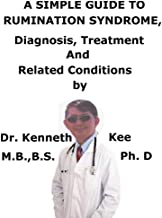Food Rumination Syndrome
Rumination syndrome is a condition in which people repeatedly and unintentionally spit up (regurgitate) undigested or partially digested food from the stomach, rechew it, and then either reswallow it or spit it out. Because the food hasn’t yet been digested, it reportedly tastes normal and isn’t acidic, as vomit is.
Cluster Number:
Wiki Number: PW190
Diagnosis: (Food) Rumination Syndrome
US Patients: 10% of institutionalized infant or child mental disabilities
World Patients:
Sex Ratio: B;G+
Age Onset: Age 11, boys; age 14, for girls.
Brain Area: This appears to be involuntary, not consciously caused by the person.
Symptoms: in children and those with cognitive disabilities, regular regurgitation of meals by involuntary contraction of abdominal muscles
Progression: Unlike normal vomit, the process is normal and unforced. Damage to the esophagus and alimentary canal, malnutrition, weight loss
Causes: Undecided.
Medications:
Therapies: For children or limited intelligence, a sour or bitter taste on the tongue is aversion training. Abdominal breathing helps others.
Youtube Video: Living With Rumination (Regurgitation) Disorder
Youtube Video:
Teen Unable to Digest His Food
Amazon or Library (Kindle Only):
A Simple Guide to Rumination Syndrome
Click the book to link or order form Amazon.
This book is “Kindle-Only.”

